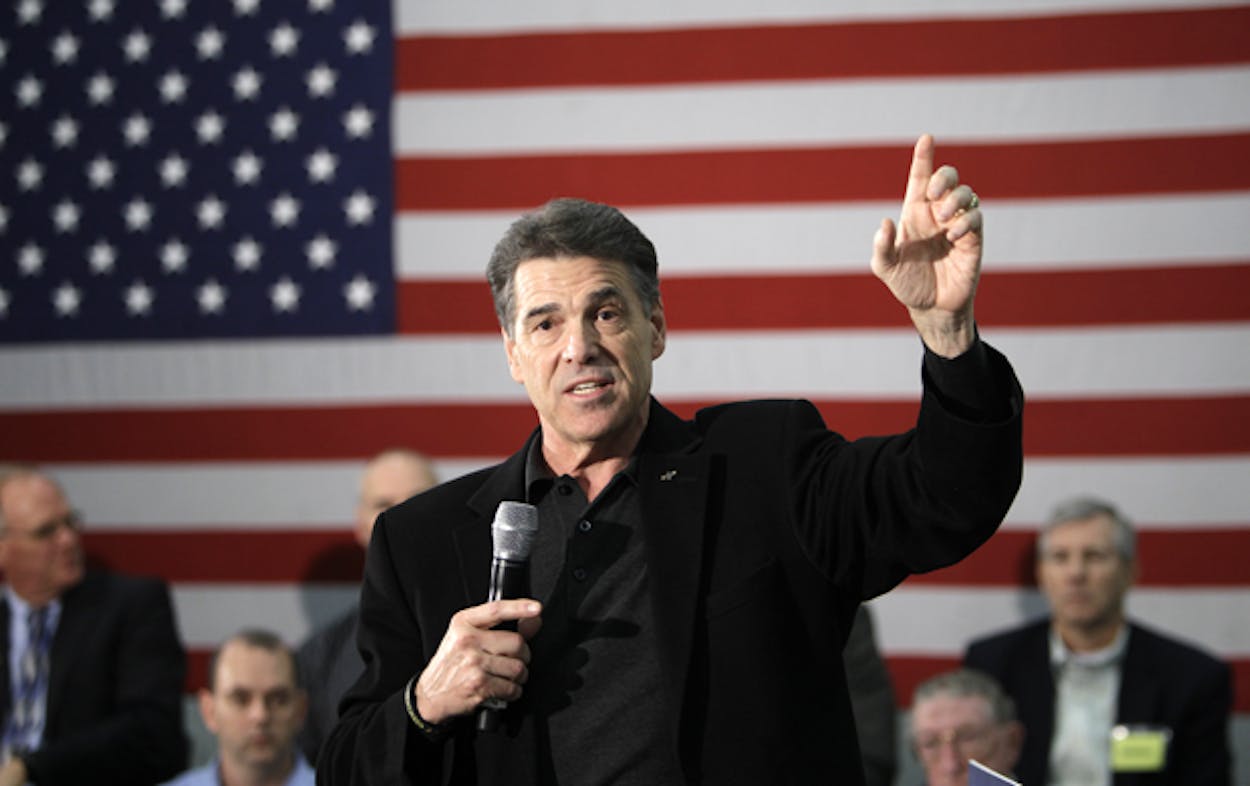In twelve short months, Rick Perry the governor became Rick Perry the Republican presidential candidate. How did this happen? In part one we saw him graduate from a politician simply promoting a book to a serious (and feared) GOP presidential primary contender. Now, how the governor went from leading the pack to polling behind Rick Santorum.
At an appearance in Iowa, the governor scores his first big controversial—and troubling—soundbite at the expense of Federal Reserve Chairman Ben Bernanke:
If this guy prints more money between now and the election, I don’t know what y’all would do to him in Iowa, but we would treat him pretty ugly down in Texas.
A Rasmussen poll of likely GOP primary voters shows Perry leading Mitt Romney nationally, 29-18.
Not too shabby for a few days’ work . . . the governor is indisputably a force to be reckoned with . . . What he brings to the race is a welcome clarity, and the prospect of a kind of challenge to Romney that has been lacking until now.
John Heileman, New York
Perry also leaps ahead of Romney in a national Gallup poll, 29-17.
Additionally, on August 22, Gallup had him in a 47-47 dead heat with Barack Obama (among registered voters) “if the presidential election were held today” (though Romney, Ron Paul and Michelle Bachmann all fared similarly).
Perry is going to be the Republican nominee. His coalition is pretty obvious from these numbers. It’s the South, the evangelicals, and the tea party geezers. What’s more, these elements of his constituency appear to be fiercely loyal. We’ve all seen this before. The only way he can lose in the primary is to make a huge mistake — but he doesn’t make huge mistakes — or be brought down by a major scandal — but he has never been implicated in a major scandal. We might as well skip the primary and go straight to the general election.
Paul Burka, “Burkablog: The Gallup Poll,” Texas Monthly
Perry cancels a scheduled appearance in South Carolina to come back to Texas and address the wildfires that are now ranging in Steiner Ranch, Bastrop, and other parts of Texas. He quickly resumes campaigning, however.
[Social Security] is a Ponzi scheme to tell our kids that are 25 or 30 years old today, you’re paying into a program that’s going to be there. Anybody that’s for the status quo with Social Security today is involved with a monstrous lie to our kids, and it’s not right.
Perry at the Reagan Library debate.
At the Fox News/Google debate, Perry comes under fire for his support of the DREAM Act, which allows students to qualify for in-state college tuition even if they were brought to the United States illegally.
“If you say that we should not educate children who have come into our state for no other reason than they have been brought there by no fault of their own, I don’t think you have a heart,” Perry said. “We need to be educating these children because they will become a drag on our society.”
But that eloquent defense didn’t necessarily win him points with Republican voters, and a few days later, he apologized for saying that the other candidates were heartless.
And in that same debate, Perry’s considerably less eloqouent attack on Romney is a sign of things to come:
The Washington Post runs a story on the “racially charged” old nickname of the Perry family hunting camp.
The Austin American-Statesman confirmed a Drudge Report story that the Perry campaign raised $17 million, more than any other candidate in the year’s third quarter.
The Perry team adds Joe Allbaugh, George W. Bush’s campaign manager from 2000.
Perry’s rousing, rambling speech at the Cornerstone Awards in New Hampshire inspires reactions ranging from “bizarre” to “full-out yell leader mode.” Watch Jon Stewart’s take (which is preceded by a lengthy segment on Herman Cain—remember him?):
The now-infamous (and signature) “oops” gaffe got the governor on Letterman and Leno, inspired several self-deprecating campaign ads, and magnified all of Perry’s subsequent misstatements, including getting the voting age (and election day) wrong in New Hampshire.
On the bright side, it did create what Perry’s gubernatorial (and presidential) predecessor might call “the soft bigory of lowered expections”—all of Perry’s debate performances since then have been seen as improvements.
Perry makes two big campaign promises, proposing that there be a part-time Congress as well as federal judicial term limits.
The New Hampshire Union-Leader endorses Newt Gingrich (remember him?). In considering Perry, the paper’s editorial page editor Drew Cline writes:
Perry can work a room beautifully, and he has good instincts on federalism and the proper size and scope of the federal government. His line about making Washington less consequential in Americans’ lives was simple and beautiful. But he has shown in the last five months that he is woefully unprepared to run for president.
And here we are in the current month, which gave us still-fresh-in-the-mind moments like Perry’s controversial “Strong” ad (and the ensuing Internet response), the governor comparing himself to Tim Tebow, and the Texas Tribune’s story about his “retirement” pension.
Meanwhile, Perry’s poll numbers in Iowa have been up-and-down (or rather, down-and-up), he’s been overshadowed by another Texan with the initials R.P.—Ron Paul trails Mitt Romney in the latest Rasmussen poll—and Perry is running fifth behind surprise third-place finisher Rick Santorum. (Former frontrunner Newt Gingrich is in fourth.)
Perry has said he wants a top three finish but will keep going if he’s fourth.
The caucus looms on January 3—which is also when the TM Daily Post will return to its regular publication schedule.
- More About:
- Politics & Policy
- Rick Perry







